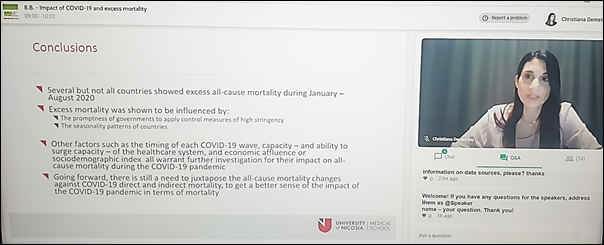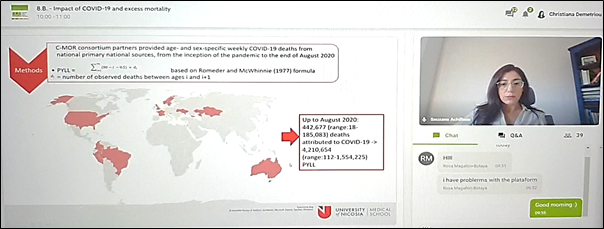November 2021
The 14th European Public Health (EPH) conference took place virtually on 10-12 November 2021. This year, the conference theme was “Public health futures in a changing world”. At the conference, three faculty members of the Department of Primary Care and Population Health were invited, through a competitive peer-reviewed abstract submission and selection process, to present the findings of their research activities. Moreover, additionally one faculty member of the Department of Primary and Population Health was invited to join the European Public Health Association (EUPHA) Governing Board which is comprised of the Delegates appointed by the Members of each represented country.
In particular, the research findings arising from two departmental projects (namely the C-MOR and the STADICAN-CY projects) were featured in the three presentations.
The C-MOR project is coordinated by the University of Nicosia Medical School and is an international consortium of 58 institutions which aims to create a reference dataset focused on mortality resulting from COVID-19. The project investigates all-cause, cause-specific, as well as COVID-19 specific mortality, during the COVID-19 pandemic.
Dr Christiana Demetriou, Assistant Professor of Epidemiology and Public Health and Principal Investigator of the C-MOR project, presented the results of the first C-MOR publication, published in the International Journal of Epidemiology in July 2021 (https://doi.org/10.1093/ije/dyab123).
This study aimed to compare observed and expected all-cause mortality during the first six months of the COVID-19 pandemic, and to investigate any excess mortality in the context of country specific COVID-19 control measures. A total of 22 countries provided national data from primary sources. Expected mortality was estimated based on all-cause mortality data from the years 2015-2019. The results of this study highlighted that several countries experienced excess all-cause mortality during the first six months of the COVID-19 pandemic, namely Brazil, Cyprus, France, Ireland, Italy, Spain, Sweden, the UK (England, Wales, Northern Ireland, and Scotland) and the USA. However, some countries experienced the same (Austria, Estonia, Israel, Norway, Slovenia and Ukraine), or even reduced (Australia, Denmark, Georgia, Cape Verde and Colombia) observed mortality compared to that anticipated. The presence and magnitude of excess mortality in the participating countries was shown to be influenced by the promptness of governments to apply control measures of high stringency, and by the seasonality patterns of countries.
In addition, Dr Souzana Achilleos, Assistant Professor of Environmental Health, presented the results of the second C-MOR publication, currently under consideration for publication by the BMC Public Health (preprint available at https://doi.org/10.21203/rs.3.rs-743603/v1 ).
This investigation aimed to provide updated information on the mortality burden of the COVID-19 pandemic in several countries around the world using potential years of life lost (PYLL) as a disease burden measure. PYLL is an accurate measure of premature mortality. It takes into account the death numbers and the age at which the death occurs, giving more weight to deaths at younger ages and less to deaths at older ages. In this sense, PYLL can provide a valid assessment of the COVID-19 mortality impact. Seventeen countries collected and provided age-group and sex specific COVID-19 death numbers, from national primary sources, and were included in this study.
South American countries were evidenced as the most impacted countries in terms of COVID-19 premature mortality. At the same time, countries in Asia and Middle East as well as Africa, were least affected. In addition, the study demonstrated a male predominance in the PYLL due to COVID-19 among all but one country, and in most countries, the majority of PYLLs were contributed by the older but not oldest age groups, despite an excess of COVID-19 deaths in the oldest age groups. The timing of the pandemic, seasonal trends, the control measures enforced, and underlying social conditions, together with country demographic characteristics, are probable explanations for the differences observed among countries.
Lastly, Dr Annalisa Quattrocchi, Assistant Professor in Epidemiology, presented results from the departmental project STADICAN-CY. STADICAN-CY (“Stage at diagnosis and cancer survival in Cyprus”) is a population-based study of patients diagnosed with cancer and included in the Cyprus Cancer Registry between 2004 and 2017.
In order to provide a better understanding of the cancer profile and cancer survival by tumour stage at diagnosis (TSD) in Cyprus, the study aimed to evaluate the distribution of TSD and the survival trends by TSD for the most commonly diagnosed cancers in the country. The project was implemented in collaboration with the Cyprus Cancer Registry of the Health Monitoring Unit at the Ministry of Health and with the Bank of Cyprus Oncology Centre.
Dr Quattrocchi presented progress made in lung and colorectal cancer survival, by TSD, in Cyprus between 2004-2017. Adults (age 15+) diagnosed between 2004-2017 with lung or colorectal cancer were included in the investigation, and TSD was categorized as localized, regional, distant and unknown, based on the Surveillance Epidemiology and End Results categorization. Five-year net survival was then estimated using two separate approaches. For both cancers, in both sexes, and for all-stages combined, 5-year net survival was shown to increase from 15% to 20% for lung cancer and from 57% to 61% for colorectal cancer respectively, throughout the study period. Looking at net survival according to TSD, localised and regional cancers displayed the most pronounced increases in survival for both cancers.
Overall, according to the study results, late stage at diagnosis was an apparent contributing factor to decreased survival of lung or colorectal cancer patients in Cyprus, and, therefore, any shift to earlier stages at diagnosis may bring substantial improvements in patient survival rates. As of such, increasing public awareness of cancer risk factors and symptoms, as well as increasing investment in early detection, is of paramount importance towards increasing lung and colorectal cancer survival in Cyprus.
Finally, Dr Elena Critselis, Associate Professor in Epidemiology and Public Health, Head of the Department of Primary Care and Public Health, and Master in Health Services Administration, was invited to join as one of the newest members of the EUPHA Governing Board (https://eupha.org/governing-board).
The EUPHA Governing Board is comprised of Delegates appointed by the Members of each of the 44 countries represented on the Board. The Annual Meeting of the EUPHA Governing Board was held immediately prior to the 14th EPH Conference and encompassed activities regarding the EUPHA work plan for the forthcoming year.




